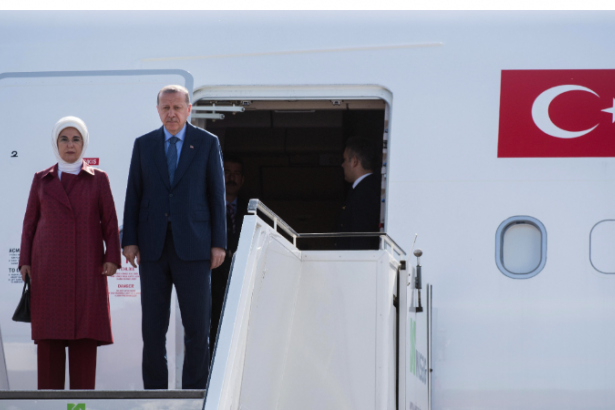Erdoğan urges a fresh start in Turkish-German relations

Chancellor Angela Merkel said on the eve of talks with President Tayyip Erdoğan that Germany wanted to work with Turkey economically.
During a panel discussion late on Thursday, Merkel ruled out direct aid for Ankara. "But we have to work together economically, and we'll certainly manage to get some agreements here," she said, without elaborating.
Turkish President Recep Tayyip Erdoğan arrived in Germany Thursday for a three-day state visit that both sides hope will help rebuild relations that have been battered in recent years. The two countries recognize "mutual strategic interests".
"Turkey is an important partner for us, and it is also an important partner for Europe," Merkel's spokesman, Steffen Seibert, said Wednesday.
"We have a fundamental interest ... in an economically and politically stable Turkey, and of course in a Turkey in which democracy is practiced," Seibert added. He said that talks with Erdoğan will address both "common interests" and difficult issues.
Erdoğan will have two meetings and a joint press conference with Merkel. He is also set to receive military honours at Berlin's Bellevue Palace, where he will be German President Frank-Walter Steinmeier's guest of honour at a state banquet on Friday evening. Finance Minister Olaf Scholz and Economy Minister Peter Altmaier will also attend this event. Ahead of Erdoğan's visit, the pair met in Berlin last week with Turkish Finance Minister Berat Albayrak.
Erdoğan is being accompanied by four senior cabinet ministers as well as secret service chief Hakan Fidan.
After a second meeting with Merkel over breakfast, Erdoğan will wrap up his visit on Saturday in Cologne, where he officially opens a new mosque built by the Ankara-controlled Islamic Ditib organisation.
In an article by Erdoğan published by Germany's Frankfurter Allgemeine daily as he began his visit, he urged Berlin to designate the group, Gülen network, that has been blaming for a 2016 coup attempt as a terrorist organisation.
Fethullah Gülen, had been a close ally of Turkish President Recep Tayyip Erdoğan's AKP government. CIA-linked Gülen network, which had been organised in the police, judiciary, military and the other states institutions, helping Erdoğan to redesign and install his Islamic-rooted AKP party in power in 2002. But his alliance with the AKP has faltered in recent years. On 15 July 2016, the network of Gülen attempted to topple down Erdoğan by a military coup but it failed.
Germany has so far said it needs more evidence to link the Gülen network to the attempt to overthrow Erdoğan.
In the opinion piece, Erdoğan also said it was time to "set aside our differences of opinion and concentrate on our joint interests."
"Turkey's hope is to develop relations with Germany and other nations as equals on the basis of mutual respect," he wrote.
GERMAN POLICE SHUT DOWN A LARGE AREA
Security was tight in the German capital, where Erdoğan was to be greeted outside Tegel airport by protesters of the group Reporters Without Borders.
Police in Berlin shut down a large area around the chancellery where Merkel was to meet with Erdoğan, including the airspace and boat traffic on the Spree river.
Organizations representing journalists and various minorities in Turkey, including Kurds and Alevites, have called protests, while an alliance is staging a march through the city on Friday entitled "Erdoğan Not Welcome." Some 10,000 people are expected. Several more demonstrations, both in support of and against the Turkish government, are planned for the second leg of Erdoğan's visit, to Cologne on Saturday.




